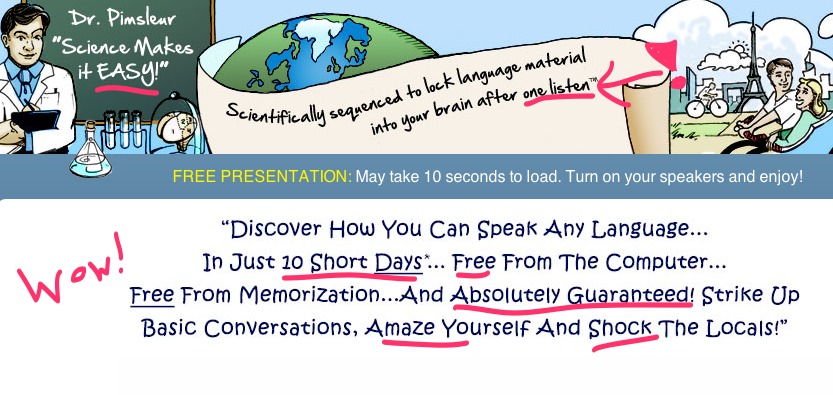As you navigate the internet, and particularly with Google and Facebook getting so smart and marketing to what seem to be your interests based on your internet activity, I’m sure you’ve seen some of these advertisements. You know- the ones that promise that you can learn any language you want.
It’s easy!
It’s fast!
It’ll happen automatically!
I recently had this one show up on my screen and it tipped the scale for me. I even had to mark it up just to show it how mad I was at it:
Oh, it doesn’t stop there. It’s not just people trying to get your money with their deceptive marketing language. It’s well-meaning bloggers and journalists who want to catch your attention and inspire you to work on a new language.
How about SocialMoms’s seven easy ways to teach your child and yourself a foreign language? You know, because labeling your home (which I do ask my students to do as a supplement!) or downloading a flashcard app is going to build your communicative competence, and taking a refresher course or meeting regularly with a conversation group, well of course those seem easy.
What about LifeHacker.com, promising you can learn to speak a new language fluently in six months? There’s so much wrong with that, starting with the word fluent and ending with the glaringly missing caveat if you do almost nothing else.
If we’re going to foster actual bilingualism in our students, they’re going to have to continue on their own after they leave our classes. To increase their chances of doing that, we have got to start telling the truth and being realistic as we communicate expectations and advice. This is the message I wish people were telling about learning another language:
You don’t have to be fluent.
Can we just get rid of the word “fluent?” Who gets to define that anyway? Depending on your circumstances and goals in life, you can learn to do a whole lot that will be helpful for you even at low levels of proficiency. That’s what we need to get people asking: “How proficient do I need to be in order to do XYZ?” The truth is, if you’re a store clerk, learning to handle a sales transaction in the type of merchandise you work with could really improve your job performance, and yes, you could do that fairly quickly if you put your mind to it. If you want to be a sales rep in the Asian market for an international company, ACTFL for one says you’re probably going to need a study abroad experience to get there. And if you just want to talk to people, research shows native speakers will tolerate a lot of grammatical error if the meaning is comprehensible. Who on the internet is selling us that message?
Go for effective, not easy.
It’s easy to drill vocabulary flashcards. It’s easy to grade multiple choice. But in a focus on communication and proficiency we go for effective, which is not necessarily easy or pretty, though it is often a lot of fun. It means we don’t do discrete word games or worksheets except the 2 days a year my AP students earn a pizza party and we play Spanish Scrabble. It means we don’t translate random sentences as a learning goal, not ever. If your goal is to communicate, the presentation, the practice, and the assessments need to involve communication. All of them. All the time.
Learning a language is not the only thing worth your time.
The world is a big place with a lot of opportunities. You should grow some flowers, enjoy the blessings of having family and friends, read a few great books (I just finished Five Days at Memorial and just started Book of Ages), go ride a roller coaster. Sure, you can do just about anything well pretty quickly if you don’t do anything else. But there are a lot of things out there worth doing, and learning a language is just one of them.
Ok, so I got really annoyed lately at these misleading advertisements and articles whirring around the internet but it all boils down to this:
Let’s tell people the truth: If you want to do something well, it’s rarely fast or easy. But often, the things that are fast and easy are NOT the things worth doing. Do something that’s worth the time you’ll have to put into it, regardless of how much time that is, or how much effort it involves. And learning another language? Definitely worth your effort.
3 Comments
Comments are closed.





Amen! Knowing words and concepts – and being able to communicate are two different things. My classes got a whole lot more purposeful when I stopped aiming for ‘fluency’ and started focusing on communication ‘ability’ and the skills that that requires. They can always find the words somewhere – its the opportunity to know ‘how’ to use, the culture nuances, the ability to reword/rephrase when you (or someone else) doesn’t ‘get it’ and to actually share ideas that doesn’t come from a program!
Thanks for your wisdom as always Colleen!
[…] sentence my student just wrote or high-five for work well done. Learning a second language is not easy or fast, and anyone who is learning one should have the chance to feel proud of themselves for […]